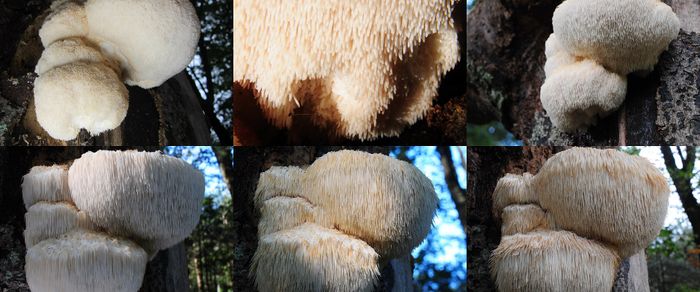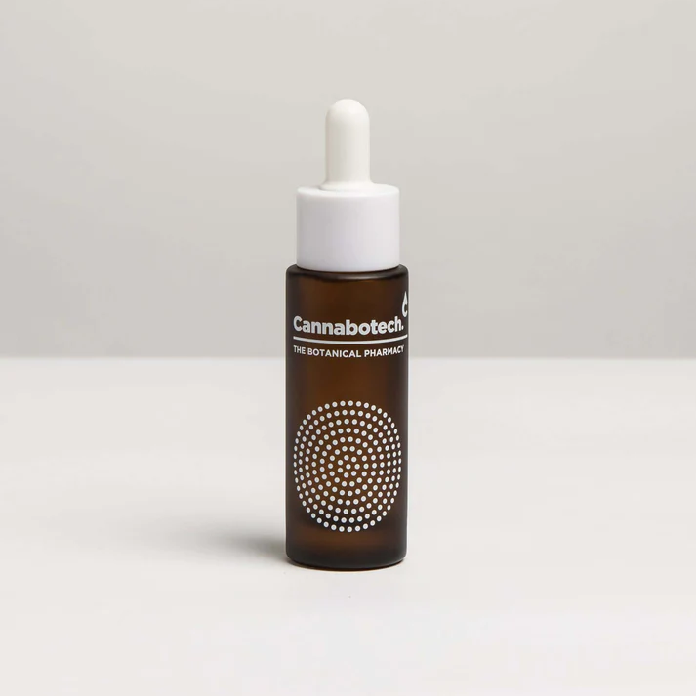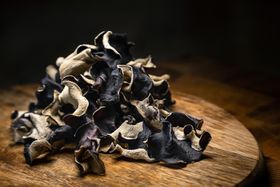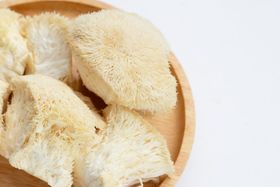The Beginner’s Guide To Lion’s Mane Mushroom & Benefits
Updated January 7, 2024.

Lion's Mane (Hericium erinaceus) is rich in vitamins such as thiamine, riboflavin, and niacin. It's also a good source of essential minerals such as manganese, zinc, and potassium. In addition, it is known to improve cognitive function, memory, and overall brain health and for its anti-inflammatory and immune-boosting properties.
Mushrooms are used for healing and as food. Lion's mane mushroom is highly valued for its benefits. Egyptians and Chinese medicine practitioners have used it for a long time.
This edible fungus is native to North America, Europe and Asia. The strange look led to many names like Monkey’s Head, Pom Pom Blanc, Satyr’s Beard, bearded tooth, and Yamabushitake.
Paul Stamets, an American entrepreneur and mycologist, simple calls it the “smart mushroom.” With its power to enhance cognitive function, memory and mood; Lion’s mane mushroom has earned this title.
We’ll cover more on its cognitive benefits shortly, but first, let’s start with the nutritional makeup of this prized mushroom?
Paul Stamets, an American entrepreneur and mycologist, simple calls it the “smart mushroom.” With its power to enhance cognitive function, memory and mood; Lion’s mane mushroom has earned this title.
We’ll cover more on its cognitive benefits shortly, but first, let’s start with the nutritional makeup of this prized mushroom?
» Find the perfect mushroom blend for your condition - take our free quiz
Lion’s Mane Mushroom Benefits: Nutrition 101
Lion’s mane mushroom is rich in β-glucan polysaccharides, essential amino acids, carbohydrates and fibre. With minerals including calcium, magnesium, phosphorus and potassium, and vitamins like folic acid (vitamin B9), thiamin (vitamin B1) and tocopherols (vitamin E)(1), its diverse array of nutrients deliver wide-ranging health benefits.
» Reduce stress with Cannabotech's Lion's Mane-infused relax drops
Lion’s Mane mushroom forms, dosage and preparation: What to look for and where to find it?
Modern research has uncovered what ancient wisdom knew; Lion’s mane mushroom delivers diverse healing benefits. Because of its potency and malleability, there is a choice in delivery routes. This means it is available in a variety of preparations.
- An edible mushroom: If you love the taste and texture, the simplest way to gain the benefits is to simply eat the fungi. Wash, chop and chomp away. Or throw a handful into salads or other recipes (hints below).
- Supplement: If you have a specific measure in mind, how can you ensure the right mushroom dosage? Supplementation is the best way to meet your target. Research shows incredible health advantages from supplementation. So, it will be easy to find a Lion’s mane mushroom supplement to suit.
- The taste of healing: If you decide to take the culinary route, what should you expect? This fungus delivers a seafood, scallop-like taste. Its texture is described as similar to lobster; stringy, fleshy, and delicate. Once cooked, it has a tender, juicy chew.
- Soups or stirfry’s to eat Lion’s mane mushroom? Any way you like! Brewed with ginger, carrot, stock and root vegetables, this fungus adds a meaty texture to a healthy soup. Or chop and stir with bok choy and onion, chilli and basmati for a delicious stir fry.
- Steeped in teas or coffees: People have been drinking mushroom beverages for a very long time. Lion’s mane’s beneficial properties are ingested with every sip. You can purchase these brews ready-made or create your own. An online search will raise ample recipes to try… Lion’s mane coffee might soon become your favourite morning brew!
- Powders, pills, tinctures or drops: Powders, pill, tinctures and drops are often made from dried mushrooms. You can find a ready-made option in health food stores or online. Asian markets often supply dried mushroom, where it’s known as “monkey head” dried mushroom. Or you can grow some in your own fungi garden or forage if it grows natively in your region.
Disclaimer: NEVER eat a mushroom that you are not 100% sure is edible! There are poisonous varieties that can cause significant harm and hallucination.
Lion's Mane Benefits
Lions mane benefits are numerous; from cognitive support to improved mood, enhanced relaxation to vibrant skin, and more.
1. Lion’s mane assists with cognitive function and brain health
Do you worry that your mind might become less than sharp as you age? Or do you wish to protect the brilliance of your brain? Maybe you’d find it helpful to enhance your memory and aid cognitive repair?
Perfect! The evidence supports Lion’s mane mushroom’s effects as a cognitive enhancer.
Your brain is created from billions of neurons; nerve cells that communicate with each other constantly. As with all parts of the body, there is a continual cycle of death and repair. This is the process of life! But if the balance becomes skewed toward the former, function diminishes…
Cognitive function and memory can take a hit.
Nerve growth factor (NGF), as its name suggests, is important for replenishing and maintaining a healthy brain. A study published in 2013 showed that Lion’s mane mushroom has neurotrophic (“nerve growing”) properties. (2) In this way, this fungus can promote brain and cognitive function.
And research into memory shows it does just that.
Memory is a complex process. It can stammer or falter due to a number of causes. A gamut of issues from stress to dementia can cause decline; sometimes temporary, sometimes not.
Many people want to improve their memory. They may forget why they entered a room or have difficulty with memory.
Lion's Mane benefits are here to the rescue.
A study in 2019 found that giving mice oral supplements for two months improved their memory. Another study found that eating Lion's mane, Reishi, and Cordyceps mushrooms may help with memory problems.
Lion's Mane promotes relaxation by supporting nerve growth factors, protecting the brain and nervous system, reducing inflammation, improving mood, and enhancing cognitive function. These benefits create a foundation for overall mental well-being and a calmer state.
2. Lion’s mane may offer mood and stress support
We, modern humans, live in a stress-filled world. The past year has been lived on constantly shifting sands, whose unstable grains have profoundly affected our collective and individual stress levels and mood.
Lion's Mane may help reduce anxiety, promote relaxation, and support optimal brain function thanks to its bioactive compounds, such as hericenones and erinacines, that interact with the nervous system and have neuroprotective effects. Additionally, Lion's mane mushrooms possesses anti-inflammatory and antioxidant properties, which can help alleviate discomfort and promote relaxation, indirectly supporting improved sleep.
Yet, again, certain fungi offer potential respite… and quite quickly.
A 2019 study found that a mere eight weeks of oral supplementation with Lion’s mane mushroom produced profoundly beneficial effects. The authors noted a decrease in depression, anxiety, and sleep disorders, and an improvement in mood disorders. Sleep quality improved too.(5)
There are wonderful products that blend Lion’s mane with other functional mushrooms like those mentioned earlier, Reishi and Cordyceps. Relax Drops by Cannabotech combines these fungi to elevate synergy and results. This formula also contains nature’s soothing ingredients, chamomile and lavender extract, to support relaxation. Add in premium non-intoxicating CBD with our unique M2CBD formula to support relaxation whenever and wherever you need to unwind.
3. Lion’s mane may support your gut health
Lion’s mane has been used for aeons for gastrointestinal support in special tonics, however research is only now making headway. You may have heard that your gut can affect your overall health, so this is particularly worth special attention.
In a 2013 study, lion’s mane mushrooms were shown to significantly reduce ulcers and gastric mucosal injury.(6) This has been linked largely to its high antioxidant profile. Other studies have also suggested that lion’s mane can help balance the microbes in the gut.
4. Lion’s Mane Benefits for Skin
Lions mane benefits the skin too.
“As within so without”, as the saying goes. Inflammation, oxidative stress, and environmental damage take their toll on both internal systems and our outermost layer.
As a great source of natural antioxidant(7) and anti-inflammatory compounds(8), Lion’s mane mushroom may calm skin problems. In fact, when applied topically, Hericium erinaceus has been shown to accelerate wound healing.(9)
As you can see, there is a range of profound benefits associated with consuming this natural healing agent.
Lion's Mane Mushroom for Blood Flow & Circulation
Lion's Mane has been found to enhance vasodilation, which leads to improved blood flow and increased delivery of oxygen and nutrients to the body's tissues. Additionally, one of its bio-actives, hericenones, has been studied for its potential muscle relaxant effects.
These effects are believed to be due to the influence of Lion's Mane on the nervous system, which may affect the activity of neurotransmitters or other signaling molecules involved in muscle relaxation. As a result,
Lion's Mane may be beneficial for individuals experiencing muscle tension or discomfort caused by various factors such as stress, physical exertion, or underlying conditions. By helping to relax the muscles, Lion's Mane could potentially alleviate these symptoms and provide a sense of relief.
5. Lion’s mane is a superfood packed with nutritional benefits
Lion’s Mane act as powerful antidotes to many ails due to the following components:
- β-glucan polysaccharides
- essential amino acids
- carbohydrates
- fibre
- vitamins and minerals including the much needed Vitamin B12 largely remiss in vegan diets
- antioxidants
- anti-inflammatory properties
What are the side effects of Lion’s mane mushroom?
Fullness if you eat too much! In all seriousness, Lion’s mane mushroom is considered to be incredibly safe. If you have an allergy to mushrooms, though, avoid this fungus along with the rest.
Lion's mane mushroom is generally regarded as safe for consumption and is believed by many to provide various health benefits, particularly for cognitive function. However, as with any supplement or natural remedy, it may have adverse effects on certain individuals. These reported side effects are usually mild and include gastrointestinal discomfort such as nausea and diarrhea.
Although allergic reactions are rare, some individuals may experience them. It is important to note that individual responses to lion's mane mushroom can vary, and it is recommended to start with a small dose to assess tolerance. Prior to incorporating lion's mane mushroom into your routine, especially if you have pre-existing health conditions or are taking other medications, it is advisable to consult with a healthcare professional.
The Lion’s Mane Takeaway
Lion’s mane mushroom contains a wide range of nutrients that are essential for bodily function as well as reparative properties. The most accurate way to ensure a therapeutic dose is by supplementing with a premium product that contains other synergistic ingredients that maximise the benefits.
We believe that the nutrients, natural and safe profile. Moreover, a wide evidence-base make Lion’s mane mushroom essential for daily use and the medicine cabinet.
References:
- Lion’s mane mushroom; new addition to food and natural bounty for human wellness: A review https://www.researchgate.net/publication/329781583_Lion’s_mane_mushroom_new_addition_to_food_and_natural_bounty_for_human_wellness_A_review
- Neurotrophic properties of the Lion’s mane medicinal mushroom, Hericium erinaceus (Higher Basidiomycetes) from Malaysia https://pubmed.ncbi.nlm.nih.gov/24266378/
- Hericium erinaceus Improves Recognition Memory and Induces Hippocampal and Cerebellar Neurogenesis in Frail Mice during Aging https://www.ncbi.nlm.nih.gov/pmc/articles/PMC6521003/
- A Systematic Review of in-vivo Studies on Dietary Mushroom Supplementation for Cognitive Impairmenthttps://academic.oup.com/cdn/article/3/Supplement_1/nzz052.P14-021-19/5518278
- Hericium erinaceus Improves Mood and Sleep Disorders in Patients Affected by Overweight or Obesity: Could Circulating Pro-BDNF and BDNF Be Potential Biomarkers? https://www.hindawi.com/journals/ecam/2019/7861297/
- Gastroprotective Effects of Lion’s Mane Mushroom Hericium erinaceus (Bull.:Fr.) Pers. (Aphyllophoromycetideae) Extract against Ethanol-Induced Ulcer in Rats https://www.ncbi.nlm.nih.gov/pmc/articles/PMC3835629/
- Composition and antioxidant activity of water-soluble oligosaccharides from Hericium erinaceus https://pubmed.ncbi.nlm.nih.gov/25529054/
- Anti-Inflammatory Effects of Ethanol Extract of Lion’s Mane Medicinal Mushroom, Hericium erinaceus (Agaricomycetes), in Mice with Ulcerative Colitis https://pubmed.ncbi.nlm.nih.gov/27481156/
- Potential activity of aqueous extract of culinary-medicinal Lion’s Mane mushroom, Hericium erinaceus (Bull.: Fr.) Pers. (Aphyllophoromycetideae) in accelerating wound healing in rats https://pubmed.ncbi.nlm.nih.gov/22135902/













